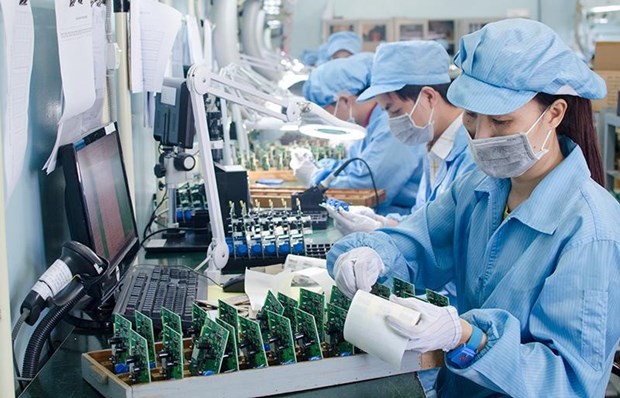 |
Vietnam is making strong progress in advancing its standing in the global semiconductor supply chain. (Photo: vneconomy.vn) |
Statistics released by Custom Market Insights in August show that the global semiconductor chip market size was valued at US$580 billion in 2022 and it will grow to US$634.5 billion this year, and US$1.12 trillion in 2032.
According to Bloomberg, chip imports from Vietnam to the US jumped from only US$321.7 million in February 2022 to US$ 562.5 million after one year to account for an 11.6 percent market share, only after Malaysia and Taiwan (China).
Aware of Vietnam’s potential in this field, many chip giants like Intel have poured investments in the Southeast Asian nation.
US-based Intel Corporation has set up a chip assembly, packaging and testing factory in Vietnam, also its biggest project worldwide, worth over US$1 billion.
Amkor Technology, one of the world's largest providers of outsourced semiconductor packaging, design, and test services based in Arizona, the US, will put into operation a US$ 1.6 billion factory in the northern province of Bac Ninh this month.
Samsung Group of the Republic of Korea said it plans to make semiconductor parts in Vietnam. Samsung is testing its ball grid array products and will mass produce them at the tech giant's factory in northern Thai Nguyen province later this year.
Tran Dang Hoa, Chairman of FPT IS – a subsidiary of tech giant FPT, who is also Chairman of FPT Semiconductor, said for the long-term, Vietnam would become a silicon valley of Southeast Asia.
He suggested Vietnam step up human resources development, enhance design capacity for domestic companies, gradually participate in the global supply chain, and attract and jointly build semiconductor factories in the country.
The biggest challenge to the domestic semiconductor industry lies with the shortage of IT engineers, he pointed out.
Reuters cited an expert in the industry as saying that “the 100-million-people country has only 5,000 to 6,000 trained hardware engineers for the chip sector, against expected demand of 20,000 in five years and 50,000 in a decade.”
Training about 30,000 to 50,000 engineers and experts is part of the Government's project on semiconductor human resources development until 2030.
Hoa said FPT plans to train 10,000 semiconductor engineers in the time ahead, adding FPT Semiconductor will cooperate with foreign educational institutions in this regard.
Synopsys Inc and Vietnam’s National Innovation Centre (NIC) have recently announced their collaboration to advance integrated circuit (IC) design expertise in Vietnam. This partnership entails Synopsys’s support for the establishment of a chip design incubation centere by NIC.
In a joint statement on the Vietnam-US Comprehensive Strategic Partnership, the two countries noted Vietnam’s sizable potential to become a key nation in the semiconductor industry.
The document also mentioned initiatives to develop human resources in the semiconductor industry, with the US providing a seed fund of US$ 2 million first.
























